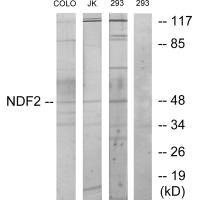Description
| Antibody Name: | NEUROD2 Antibody (PACO21862) |
| Antibody SKU: | PACO21862 |
| Size: | 100ul |
| Host Species: | Rabbit |
| Tested Applications: | ELISA, WB |
| Recommended Dilutions: | ELISA:1:2000-1:10000, WB:1:500-1:3000 |
| Species Reactivity: | Human, Mouse, Rat |
| Immunogen: | Synthesized peptide derived from internal of human NDF2. |
| Form: | Liquid |
| Storage Buffer: | Rabbit IgG in phosphate buffered saline (without Mg2+ and Ca2+), pH 7.4, 150mM NaCl, 0.02% sodium azide and 50% glycerol. |
| Purification Method: | The antibody was affinity-purified from rabbit antiserum by affinity-chromatography using epitope-specific immunogen The MGC Project Team, Genome Res. 14:2121-2127(2004). |
| Clonality: | Polyclonal |
| Conjugate: | Non-conjugated |
 | Western blot analysis of extracts from COLO cells, Jurkat cells and 293 cells, using NDF2 antibody. |
| Synonyms: | Neurogenic differentiation factor 2; NeuroD2; NeuroD-related factor; NDRF; NEUROD2 |
| UniProt Protein Function: | Transcriptional regulator implicated in neuronal determination. Mediates calcium-dependent transcription activation by binding to E box-containing promoter. Critical factor essential for the repression of the genetic program for neuronal differentiation; prevents the formation of synaptic vesicle clustering at active zone to the presynaptic membrane in postmitotic neurons. Induces transcription of ZEB1, which in turn represses neuronal differentiation by down-regulating REST expression. Plays a role in the establishment and maturation of thalamocortical connections; involved in the segregation of thalamic afferents into distinct barrel domains within layer VI of the somatosensory cortex. Involved in the development of the cerebellar and hippocampal granular neurons, neurons in the basolateral nucleus of amygdala and the hypothalamic-pituitary axis. Associates with chromatin to the DPYSL3 E box-containing promoter. |
| NCBI Summary: | This gene encodes a member of the neuroD family of neurogenic basic helix-loop-helix (bHLH) proteins. Expression of this gene can induce transcription from neuron-specific promoters, such as the GAP-43 promoter, which contain a specific DNA sequence known as an E-box. The product of the human gene can induce neurogenic differentiation in non-neuronal cells in Xenopus embryos, and is thought to play a role in the determination and maintenance of neuronal cell fates. [provided by RefSeq, Jul 2008] |
| UniProt Code: | Q15784 |
| NCBI GenInfo Identifier: | 98986461 |
| NCBI Gene ID: | 4761 |
| NCBI Accession: | NP_006151.3 |
| UniProt Secondary Accession: | Q15784,Q8TBI7, Q9UQC6, |
| UniProt Related Accession: | Q15784 |
| Molecular Weight: | 48kDa |
| NCBI Full Name: | neurogenic differentiation factor 2 |
| NCBI Synonym Full Names: | neuronal differentiation 2 |
| NCBI Official Symbol: | NEUROD2 |
| NCBI Official Synonym Symbols: | NDRF; bHLHa1 |
| NCBI Protein Information: | neurogenic differentiation factor 2 |
| UniProt Protein Name: | Neurogenic differentiation factor 2 |
| UniProt Synonym Protein Names: | Class A basic helix-loop-helix protein 1; bHLHa1; NeuroD-related factor; NDRF |
| UniProt Gene Name: | NEUROD2 |
| Antibodies | ELISA Kits |
| NEUROD2 Antibody (PACO01162) | NDF2 Colorimetric Cell-Based ELISA |
| Secondary Antibody |
| Anti-HRP Goat Anti-Rabbit IgG (H+L) Antibody (CABS014) |
| Recommended Products |
| Anti-FITC Goat Anti-Rabbit IgG (H+L) Antibody (CABS011) |
| Anti-HRP-conjugated Beta Actin Antibody (CABC028) |






